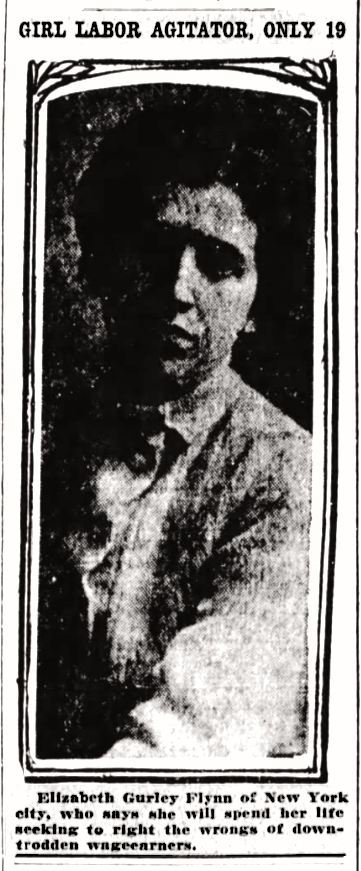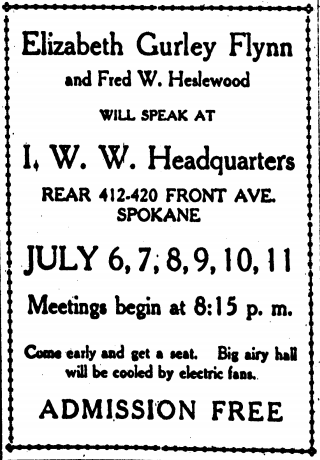 ———-
———-
Hellraisers Journal – Sunday July 11, 1909
Spokane, Washington – June 29th Speech of Gurley Flynn, Part II
From the Spokane Industrial Worker of July 8, 1909:
ELIZABETH G. FLYNN ADDRESS TO WORKERS
———-
Address of Miss Elizabeth Gurley Flynn, Organizer and lecturer of the Industrial Workers of the World, given at Spokane, Wash., on Tuesday evening, June 29, 1909 [Part II].
The Slave Market.
Go look down the street to these employment agencies and what do you see? You see, “Men wanted-a dollar and a half, two dollars, two dollars and seventy-five cents per day.” And a lot of these men work for two dollars and a half, because they must; and if you want two dollars and a half, there will be probably the together fellow that will cut you down to two dollars, and the man gets the job, takes a wage upon which he can barely exist and hold body and soul together, and he does not know after his job tonight where his supper is to be had a week from tonight! And that working man and men is the type that forms the average worker in this country, these “Jobless” are the man that is so anxious for a job at two and half dollars or a dollar and seventy-five cents a day.
And what comes of the rest of the labor’s production; where goes the millions upon millions that labor produces? Surely the dollar and seventy-five cents, the dollar and a half, or even three dollars a day does not represent the sum total of the product of labor; for if it did, the worker would not be getting his wage. The employer does not take us for love; he does not like us and he does not give us a job because we are going to be brothers in heaven. That does not interest him a bit. The only thing he worries about is, can he make a profit on our labor and if he cannot, surely we won’t get the job. And so it stands to reason, no matter how high or how low our wages, there is something over and above, that goes to the master for himself and the bargain that we make is simply divvying up with the men that employ us and saying to them we will work in your factory and I will give you the bulk of the product, work the first two hours for myself, produce my wage, ad then pay you for being a good boss and giving it to me; and then the rest of the day put in producing enough to pay for the raw material, the wear and tear on the machinery and reward you for allowing me to produce it for you; and of course the capitalists say to such a bargain as that “Absolutely delighted,” and accept. (Applause.)
The United States census shows how the producers of the necessities of life get one-fifth of their product as wage, and the four-fifth goes to the running of the industries and the men that own the industries; goes to them that they may be able to employ back a certain amount of the workers as personal servants, as men to wait upon their every wish, their wives and children, their dogs and their cats and their horses, to serve them as slaves as the slaves of Rome served their masters; and the one-fifth that we get, spells for us a meager existence, shoddy clothing, unsanitary houses to live in, adulterated food, no reading matter, no amusement, no travel, nothing but labor and labor again! And that is the reason for the great big class struggle that is existing in modern day society; that is the reason for the strikes and the lockouts and the never-ending warfare that daily goes on between the master and the workers.
The Class Struggle.
The class struggle exerts itself in two forms; in a demand on the part of the worker for more wages, for shorter hours, for safer working conditions and thus the unconscious and sometime conscious striving of the class as a whole to get possession of the means of production and the source of raw material; in other words, a struggle for a little more of their production today that they can put themselves in fighting condition to take the whole loaf. (Applause.)
The union movement rests on the part of the workers to organize that power that the capitalist has to purchase from us and the only power that we control, the power of wealth producers; and the union movement is strong only in organizing that power which seems to lie within the citadel of the corporation; and there is no situation in any kind of warfare that is quite so strong as the hole that you have inside the fort of the enemy; and this power of wealth producers lies in the union movement only as we are organized the way that it is organized in the shops and the mills, the mines and the factories. If we organized according to the method of wealth production of 25 years ago it is worse than useless; it is a drag upon the workers. Only as we organize according to the method of wealth production of now; is it a power in the hands of the workers. That is the contract blank, craft union type, it is the American Federation of Labor and the opposite is the type of the Industrial Workers of the World. We want to organize our power as wealth producers as we have it organized in the various industries, and the American Federation organizes it as it used to be to carry on the industries half a century ago.
Now let me give you an instance of that, so that you may realize from experience the weight of the argument. We had a strike in New York City that was typical for three forms of scabbery. It was a strike of the Interborough Railroad workers; the road was owned and controlled by August Belmont, who is the tool of the Rothschilds of France. August Belmont was at that time president of the Civic Federation, and side by side on the federation sat Mr. Samuel Gompers, president of the American Federation of Labor.
The engineers and firemen, conductors and motormen went out on strike, as it was in the transition made between locomotive and electric systems. The electricians, organized in the electrical union, good union men, but in a different union, stayed at work. “Farleyites” [scabs recruited by James Farley] ran the trains. After that, there come the boys from Columbia university, who thought it was such fun to run a train. You know they had never done an honest day’s work in their life, so it was fun to them; but it was a matter of life and death to the wives and children of the strikers, but what did they care? They came and they were trained under Mr. Seth Low, who was than president of Columbia university, now president of the Civic Federation.
Gompers, the Bosses’ Friend.
Note the connection now. To New York, came Mr. Samuel Gompers and Mr. Mann, who was president of the street car workers. They looked over the situation and they said to the men. “Go back to work; you have broken your contract.” The men refused on the philosophy that they might just as well starve idle as starve working; it was a case of starve anyhow.(Applause.) Mr. Gompers and Mr. Mann went straight away from New York-those friends of the workers-and left them high and dry, stranded. They never received the slightest assistance from organized labor and their union was broken; their strike absolutely defeated. You cannot find a union man on that road today. If you speak of the union as I spoke to one of them he would say to you, “Don’t say anything about it around here. I might lose my job if they heard us talking about it.”
That is the road of August Belmont, the great friend of organized labor! And didn’t Brother Gompers, who believed in the interests of capital and labor, serve well Brother Belmont? Oh, you just bet he did! But the workers, what about them? They learned that there were several forms of scabbery; that there were scabs besides Farleyites. Farleyites are at least honest scabs; they are scabs and they know it; they admit that they are antagonistic to organized labor; but these electricians, what about them? Didn’t they assist in breaking the strike just as much as the Farleyites? They were in a measure scabs also, but the only difference was this; that they were organized union scabs with union cards. (Applause.)
And they learned also that the contract system enforced by their leaders is simply a rope around them tying them down to the master class; that as long as they are bound down by a contract that their leaders call upon them to enforce, the masters and not they, are in supremacy; and they learned that to invest their power of action in a few men simply made those men tyrants over the men to whom they should be servants.
[Continued in next week’s Industrial Worker.]
[Photograph and emphasis added. AD from page 4 this issue.]
~~~~~~~~~~~~~~~~~~~~~~
SOURCES
Quote EGF re Useless Capitalist Class, Ptt Prs p47, Sept 27, 1908
https://www.newspapers.com/image/142163029/
Industrial Worker
(Spokane, Washington)
-July 8, 1909
https://www.marxists.org/history/usa/pubs/industrialworker/iw/v1n17-jul-08-1909-IW.pdf
IMAGES
EGF, Spk Rv p7, July 9, 1909
https://www.newspapers.com/image/566226975/
AD EGF w Fred Heslewood, Spk IWW HQ, IW p4, July 8, 1909
https://www.marxists.org/history/usa/pubs/industrialworker/iw/v1n17-jul-08-1909-IW.pdf
See also:
Tag: EGF 1909
https://weneverforget.org/tag/egf-1909/
National Civic Federation
https://en.wikipedia.org/wiki/National_Civic_Federation
James Farley, Professional Strikbreaker
https://en.wikipedia.org/wiki/History_of_union_busting_in_the_United_States#James_Farley_inherits_the_strikebreaker_title
College students as scabs in Interborough Rapid Transit Strike of 1905
https://en.wikipedia.org/wiki/History_of_union_busting_in_the_United_States#College_students_as_strikebreakers_in_the_Interborough_Rapid_Transit_strike_of_1905
~~~~~~~~~~~~~~~~~~~~~~~~~~~~~~~~~~~~~~~~~~~~~
Casey Jones the Union Scab – Mark Ross
Lyrics by Joe Hill


